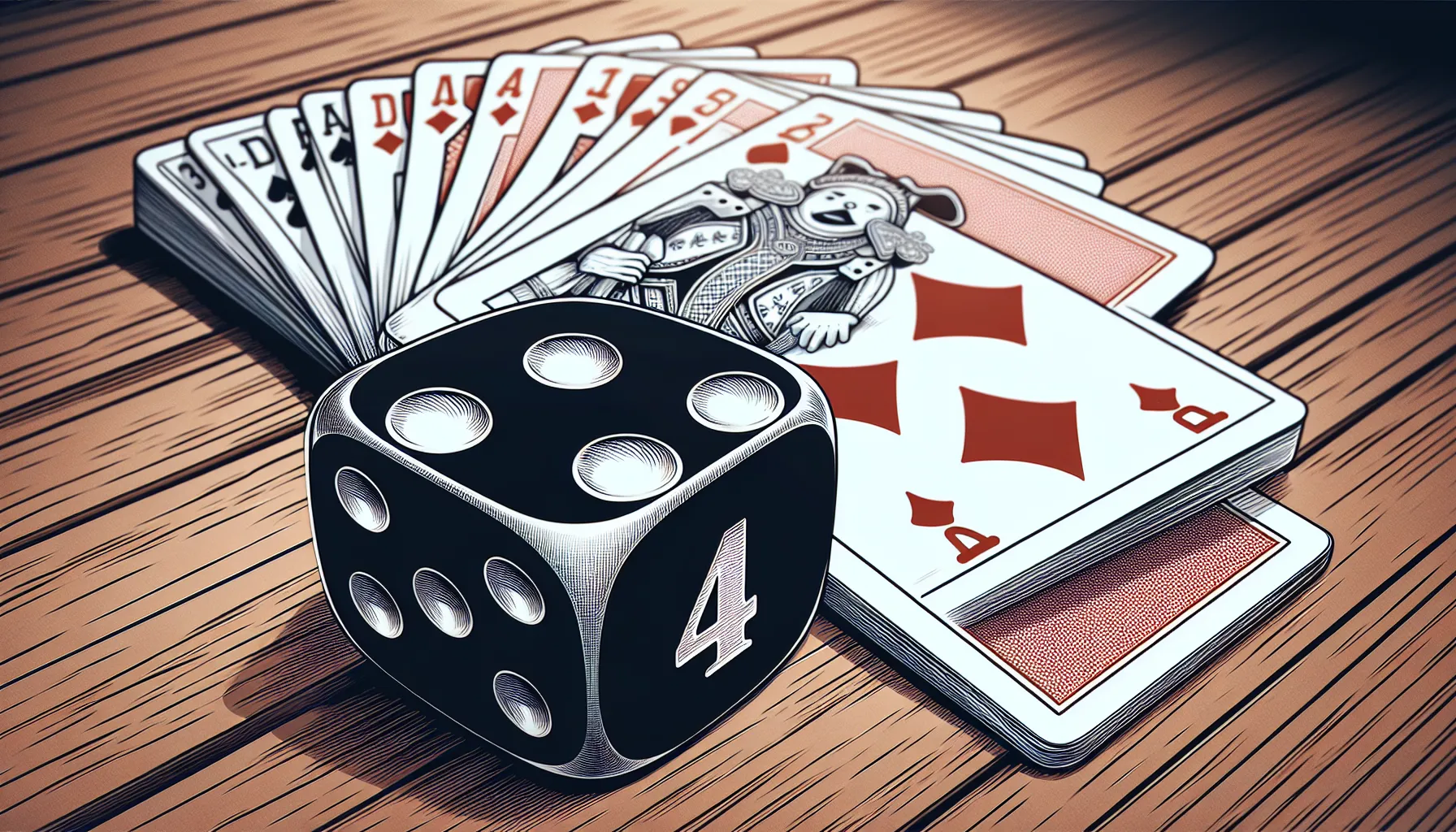Winning a game often feels like a mix of skill, strategy, and a little bit of luck. But have you ever wondered if there’s a way to predict your chances of success? Understanding probability can give you a clearer picture of how likely you are to win and help you make smarter decisions during gameplay.
Probability isn’t just for math enthusiasts—it’s a practical tool you can use to analyze outcomes and improve your strategies. Whether you’re rolling dice, drawing cards, or competing in a sports match, knowing how to calculate the odds can give you an edge over your opponents.
In this article, you’ll learn simple steps to calculate the probability of winning a game. By breaking it down into easy-to-follow concepts, you’ll be able to apply this knowledge to any game and boost your confidence in making the right moves.
Understanding Probability
Probability measures the likelihood of an event occurring and is vital for analyzing game outcomes. By understanding it, you can predict results and make strategic decisions effectively.
Basics Of Probability Theory
Probability refers to the ratio of favorable outcomes to total possible outcomes. Represented as a number between 0 and 1, a probability of 0 implies impossibility, while 1 indicates certainty. To compute it, divide the number of favorable outcomes by the total number of outcomes. For example, in a dice roll, the probability of rolling a 4 is 1/6, since one favorable outcome (rolling a 4) exists out of six total outcomes.
In games with multiple independent events, probabilities multiply to calculate the final likelihood. For instance, in flipping two coins, the probability of both landing heads is 1/4 because each coin’s probability (1/2) is multiplied.
The Importance Of Probability In Games
Games often rely on chance, making probability a critical component of gameplay. It helps assess risks, estimate rewards, and decide on optimal strategies. In card games, like poker, calculating probabilities can guide decisions on betting or folding. In board games using dice, predictions based on possible rolls improve planning.
Probability analysis reveals whether certain actions are worth the risk, improving your ability to make informed choices. By incorporating probability into strategy, you can increase the likelihood of success and minimize the uncertainty in gaming scenarios.
Factors Influencing Winning Probability

Winning probability depends on various elements that shape outcomes in different gaming scenarios. Understanding these elements helps refine analysis and improve decision-making.
Skill Level And Strategies
Your expertise and ability to deploy effective strategies directly affect game outcomes. Higher skill levels increase the accuracy of decisions, while well-planned strategies enhance your chances of capitalizing on opportunities. For instance, experienced players in chess can anticipate opponent moves and adjust their tactics accordingly. Skill development improves performance, particularly in games requiring problem-solving or prediction.
Randomness And Luck
Uncontrollable factors, like chance events, often influence outcomes. Games involving dice rolls, shuffled cards, or spinning wheels rely heavily on randomness. For example, rolling a specific number on a six-sided die has a fixed probability of 1/6, regardless of skill. While you can’t predict luck, understanding statistical chances can still guide your choices and mitigate risk.
Game Rules And Conditions
The structure and constraints of a game determine the range of possible outcomes. Rules define how probabilities are distributed, such as the fixed odds in roulette or balanced mechanics in board games. External conditions, like time limits or resource availability, might also alter strategies and probabilities. Adapting to these variables ensures your decision-making aligns with the game environment.
Steps To Calculate Probability Of Winning A Game

To calculate the probability of winning a game, focus on identifying the key components of the event, analyzing outcomes, and applying the mathematical formula. Follow these steps to simplify the process.
Define The Event And Outcomes
Identify the specific event you want to calculate. For example, winning a single dice roll or obtaining a specific hand in a card game. Determine the total possible outcomes for the event by considering all the scenarios that can occur. For a 6-sided dice roll, the total outcomes are 6, while for a deck of 52 cards, it is 52 for drawing one card.
Analyze Favorable Outcomes
Pinpoint outcomes that lead to winning. These are favorable outcomes based on the game rules. For example, rolling a 4 on a dice has one favorable outcome out of six possible. If an event involves drawing a red card from a deck, the favorable outcomes are 26 (half of 52). Accurate identification ensures a precise calculation.
Apply Probability Formula
Use the formula: Probability = (Number of Favorable Outcomes) / (Total Possible Outcomes). Substitute the values identified earlier. For a dice roll targeting a 4, the probability equals 1/6 or approximately 0.167. For drawing a red card, it becomes 26/52, simplified to 1/2 or 0.5. Always express probability as a fraction, decimal, or percentage, depending on clarity needs.
Common Challenges And Mistakes

Calculating the probability of winning a game isn’t always straightforward. Errors and oversights can lead to inaccurate results, affecting your strategies and decisions.
Misinterpretation Of Rules
Understanding the game’s rules is crucial for reliable probability calculations. Misinterpreting rules or overlooking exceptions can lead to flawed assumptions. For instance, failing to account for a rule that changes the number of favorable outcomes mid-game, like drawing replacement cards in a card game, can skew your calculations. Always review the rules in detail before applying probability formulas.
Overlooking Variables
Ignoring key variables impacts the accuracy of your probability assessment. Complex games often have multiple influencing factors, such as player actions, random events, or conditional outcomes. For example, in a board game with dice rolls and player decisions, both the dice probabilities and opponents’ strategies affect your chances of success. Including all relevant variables ensures more precise calculations.
Practical Examples Of Calculating Winning Probability
Applying probability concepts to real-world scenarios helps clarify their relevance. Here are examples from different types of games where probability calculations enhance decision-making.
Example From Board Games
In a game like Monopoly, calculating probabilities can guide decision-making. For instance, if you’re six spaces away from landing on a high-rent property owned by an opponent, you can determine the likelihood of rolling a total of 6. With two 6-sided dice, the total number of outcomes is 36, and there are 5 favorable combinations (1+5, 2+4, 3+3, 4+2, 5+1). Using the formula, the probability of rolling a 6 is 5/36, or approximately 13.89%. Knowing this helps decide whether it’s worth risking high penalties or using a strategy card if available.
Example From Sports Games
In soccer penalty shootouts, calculating probabilities aids in strategizing. If a player’s historical penalty success rate is 75% and the goalkeeper’s save rate is 20% for penalties, the chance of scoring can be calculated. Assuming independence of events, the player’s probability of scoring remains 75%. However, if you combine team statistics, such as the likelihood of a goalkeeper guessing the correct direction based on prior games, the combined probabilities provide more insights. For instance, if the goalkeeper guesses the correct direction 50% of the time and blocks 40% of those accurately guessed, the scoring probability decreases.
Example From Casino Games
In blackjack, knowing the probability of drawing a specific card can influence your next move. Suppose the deck is standard with 52 cards, and you’ve already seen four 10-value cards in the game. The number of remaining 10-value cards is 12, with a total of 48 cards still in play. The probability of drawing a 10-value card for your next turn is 12/48, or 25%. This calculation helps decide whether to “hit” or “stand” based on achieving a target hand value without exceeding 21.
Tools And Resources For Probability Calculation
Using the right tools simplifies probability calculations, improving accuracy and saving time. Below are reliable resources to enhance your probability assessments.
Online Probability Calculators
Online probability calculators provide instant results for simple and complex scenarios. These tools only require you to input values such as total outcomes and favorable outcomes. Examples include Omni Calculator, which supports various probability types like independent and dependent events, and Calculator Soup, which handles permutations and combinations effectively. Use these to verify manual calculations or handle multi-step problems efficiently.
Probability Software And Apps
Using specialized software and apps offers more functionality than basic calculators. Tools like MATLAB and Wolfram Mathematica include advanced features for statistical modeling. Apps such as Statistics Calculator++ or Probability Distributions focus on mobile convenience while providing detailed insights into probability distributions and events. These resources are essential for frequent gamers, educators, or researchers working with extensive probabilistic data.
Conclusion
Mastering the calculation of probability can transform the way you approach games, giving you a strategic edge and boosting your confidence. By understanding the chances behind every move, you can make smarter decisions, reduce uncertainty, and enhance your overall gameplay experience.
Whether you’re rolling dice, drawing cards, or analyzing complex scenarios, probability equips you with the tools to predict outcomes and adapt your strategies. With practice and the right resources, you’ll find it easier to navigate challenges, avoid common mistakes, and improve your chances of winning in any game.
Frequently Asked Questions
What is probability in gaming?
Probability in gaming is the measure of how likely an event is to occur. It helps players analyze potential outcomes, assess risks, and make informed decisions to improve their gameplay strategy.
How is probability calculated in a game?
To calculate probability, divide the number of favorable outcomes by the total possible outcomes. For example, the probability of rolling a 4 on a 6-sided dice is 1/6.
Why is understanding probability important for gaming strategies?
Understanding probability allows players to estimate risks, predict outcomes, and make better strategic decisions, increasing their chances of success in competitive or chance-driven games.
How does probability influence games of skill versus games of chance?
In skill-based games, probability helps refine strategic decision-making, while in chance-based games, it allows players to understand the likelihood of events and manage risks more effectively.
What are common mistakes in calculating probabilities for games?
Common mistakes include misunderstanding game rules, ignoring key variables like randomness or strategy, and miscalculating total or favorable outcomes, leading to inaccurate assessments.
Are there tools available for calculating probabilities in games?
Yes, tools like Omni Calculator, Calculator Soup, MATLAB, and mobile apps simplify probability calculations. These resources are ideal for both casual players and professionals needing accurate results quickly.
Can probability improve decision-making in casino games?
Absolutely. Understanding probabilities in games like blackjack or roulette gives players insights into likely outcomes, helping them manage bets and make smarter playing decisions.
What role does randomness play in probability during a game?
Randomness introduces uncertainty in gaming outcomes. Probability helps account for this uncertainty, enabling players to anticipate possible scenarios and adjust their strategies accordingly.
How can probability be used in board games like Monopoly?
In Monopoly, probability helps estimate the chances of rolling specific dice totals, guiding decisions like when to buy properties or avoid risky moves.
Do historical data and statistics influence probability in sports games?
Yes, historical success rates and player statistics can be used to calculate probabilities, such as estimating the likelihood of scoring in a penalty shootout.
Does probability guarantee success in gaming?
No, probability doesn’t guarantee success but increases the likelihood of informed decision-making, reducing uncertainty and improving overall strategies.

